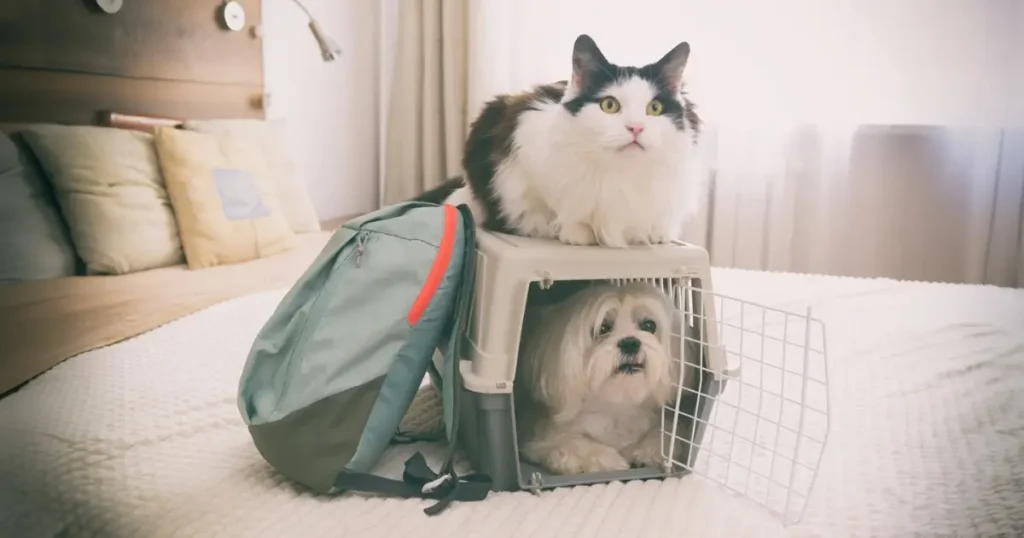
Photo by humonia / Getty Images
Canada faced unprecedented destructive wildfires last year, with over 7,000 fires recorded through the year, burning a total of 17,203,625 hectares. For context, this area is approximately equivalent to the entire land mass of Nova Scotia – three times over.
While a great deal of work is being done at all levels of government, by residents and NGOs and others, reminders on how we can keep our families safe are essential. The Fur-Bearers has compiled a list of tips for how to prepare for an emergency if your family includes a pet – be they a cat, dog, or hamster. Please consider reviewing this list with your family and sharing it with neighbours, community members, or others to ensure that no one gets left behind.
Emergency Kits
Having an emergency kit for your family is an important step that we can all take to be ready in case of an evacuation order or due to other danger. Pet emergency kits should include:
- Pet first aid kit
- Food: 72 hours of food, with a can opener if needed, potable water, and bowls (collapsible bowls save space and weight). A small explanation of their feeding schedule can also be helpful.
- Medication: 72 hours of any required medication, including an outline of their medication schedule, information on any medical conditions, and contact information for your veterinarian.
- Paperwork: Anything that establishes ownership (such as registration paperwork, municipal registration, ownership records, pet insurance policies, microchip information). This is also a great place to include information about your pets’ temperament, special needs, vaccination history, or other relevant information.
- Leashes: Keep a leash, collar with ID tags, harness, and other similar supplies in the kit. Smaller animals who can travel in carriers can have their carrier included (and your emergency kit may even fit inside the carrier for storage).
- Clean up: You gotta go when you gotta go. Add extra poop bags, hand sanitizer, cleaning wipes, litter, litter pans/trays, plastic bags for used litter, scooper, bedding (for small mammals) and other supplies as your pet may need.
- Comfort and distraction: Keeping pets calm and relaxed can be difficult in emergency situations, be sure to bring a toy, comforting blanket, or other item that may help them feel more at ease during a difficult time.
- A photo of your pet (with you) in case you become separated, along with a clear description of your pet including any unique markings.
Evacuation Plans
- If you live in a fire-prone area, knowing where evacuation centres are is a must. You can also plan ahead and find out if they accept pets, and what requirements they may have. If pets aren’t allowed, you can find local motels, pet boarding areas, or develop a list of family and friends outside of your area who may be able to help during an emergency. Make sure you call ahead to any animal shelter/boarding facility to find out if they have space before arriving.
- Ensure that your pet always has a collar with their ID and keep microchip data up to date. If you’re not sure how to update your microchip data, or if your pet has one, contact your veterinarian; they have devices that scan microchips and can help you identify how to update it.
- Know your pets hiding places. Just like us, pets of all types can get scared and want to hide from danger. Knowing where they may hide and how to access them – and including it in any written family evacuation plan – can save precious time in the event of an emergency. In the same vein, practice having your pet in their carrier so they are more comfortable (we recommend lots and lots of treats and making it a game!) should the need arise.
- Get a pet alert sticker for your home. These simple stickers can indicate to emergency responders that there are pets present. Contact your local SPCA or humane society to see if they have some available.
- Store everything in dry, easy-to-access areas.
- If you have larger animals or live in an agricultural area, please contact a local agency to help develop a specific plan to meet your needs. If you have horses on your property, check out this plan from the American National Fire Prevention Association.
Spending time each year reviewing your emergency kits and evacuation plans can help you, your family, and your community stay safe if wildfires or other emergencies arise. Please always be aware of the status of wildfires in your community, including outdoor burning rules and temporary measures. In British Columbia you can stay up to date by following BC Wildfire Service on social media or visiting their website (click here for a full list of their resources and links).
Did we not include something in this list? Let us know at info@TheFurBearers.com!
Ontario SPCA (1) (2)
Red Cross
National Fire Protection Association (NFPA)
PetSecure (Pet Insurance)
Government of Canada (1) (2)
